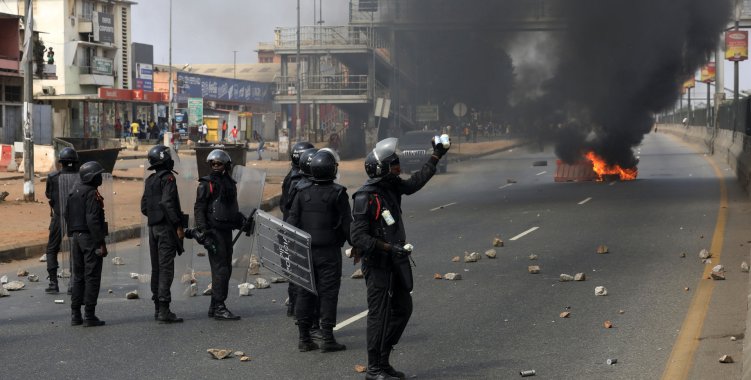According to Paulo Fontes, from the campaign directorate of the Portuguese section of Amnesty International, the petition will be launched during the vigil that the non-governmental organization (NGO) is holding on Tuesday at the Angolan embassy in Lisbon "for justice for victims of police violence in Angola".
"On the same day as the vigil, we will launch a petition calling for an end to the use of excessive, disproportionate and lethal force by security forces in exercising freedom of expression and freedom of assembly and for a thorough investigation and accountability for all the crimes committed. And that there is also, obviously, reparation and justice for the families of the victims", said Paulo Fontes.
The leader of the Portuguese section of the international NGO for the defense of human rights added that the vigil is part of the work that has been carried out.
"We will continue to campaign for Angola and carry out various actions, from petitions to street actions, campaigns, vigils. And we will not stop until freedom of expression, freedom of assembly and human rights in general are restored in Angola and around the world, but in this specific case, in Angola", he reiterated.
Asked whether, compared to the consulate of former Angolan president José Eduardo dos Santos, the current regime, led by João Lourenço, has tightened repressive measures and the conditioning of the expression of civil liberties, Paulo Fontes replied in the affirmative.
"Yes. Despite some early times when the arrival of João Lourenço brought a lot of hope for openness and greater freedom for civil society, what has happened more recently is a strong repression, increasing and seemingly endless, of civil society ", he considered.
"It has even had a somewhat snowball effect, in the sense that people have taken to the streets to demonstrate, asking for better governance, asking for economic and social rights because of the rising cost of living, because of the their day-to-day lives need other responses from the rulers, and these manifestations of theirs were strongly repressed", he added.
Amnesty, he revealed, has "documented cases of dozens of young people who suffered police violence and repression by the authorities when they tried to demonstrate, some of them even paying with their lives".
Paulo Fontes lamented that in Angola demonstrators, activists, "all people who are a dissenting voice are seen by the Angolan authorities as nuisances and are repeatedly treated as criminals, when this is not true". "It is, on the contrary", he creased.
"These people, these voices, this dissent, these demonstrators must be seen as a guide, as a compass for social and political issues that need deeper analysis and need a more careful look at governance They must be the guide and beacon of governance and not be seen as a threat," he said.
Contrary to what he considers to be the way in which the Angolan authorities view the demonstrators, "as a threat, as doing something wrong", Paulo Fontes underlined that those who participate in the protests "are not doing anything wrong".
"They are fully exercising their rights that are enshrined in international treaties that have been ratified by Angola. The Angolan Constitution itself also guarantees this right and, deep down, it is not being made transparent and is not being allowed to be exercised by the population", pointed.
Regarding the effects of this type of initiative on Angola's external image, Paulo Fontes referred that Amnesty International's expectation "is that it has an effect in the sense that João Lourenço and the Angolan leaders, the Angolan authorities, understand that the eyes of the world and, in this very specific case of Portugal, they are set on what is happening".
"It doesn't just stay inside. And we are aware of what is happening in Angola and here are some signs that our collective action has a positive impact", he stressed, recalling the petition launched by Amnesty International for the release of the musician Tanaice Neutral.
"For example, we recently made a petition that had more than six thousand signatures and that we sent to the Angolan authorities asking for the release of a young musician and who, with his music, also pointed out what should change in society. In addition, he was unjustly imprisoned for about 18 months and with serious health problems and was not released, despite having two release orders due to his state of health", he detailed.
The release of Tanaice Neutro was not immediate. It took place on June 23, but Paulo Fontes considered that after a campaign by Amnesty and other civil society organizations, the petition was important.
On Tuesday's vigil, Angolan activist Kenidi Domingos also participates.







